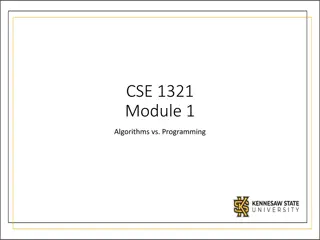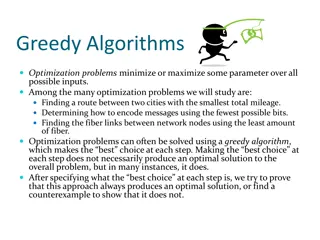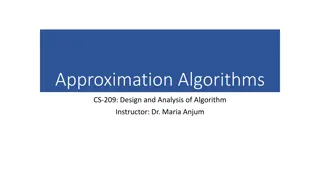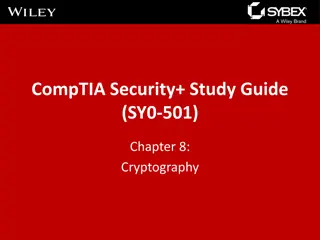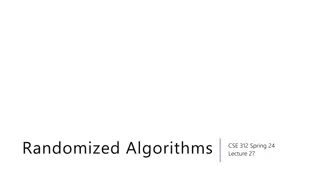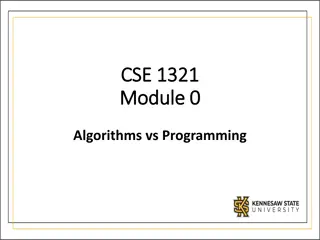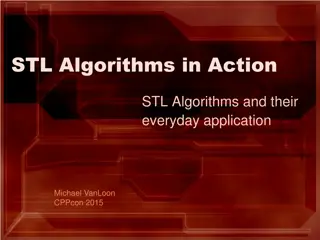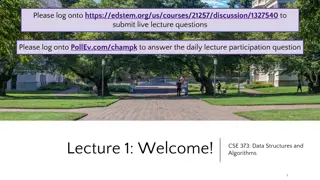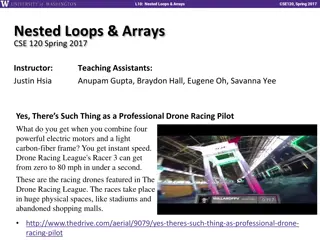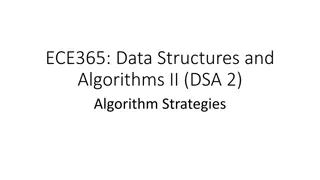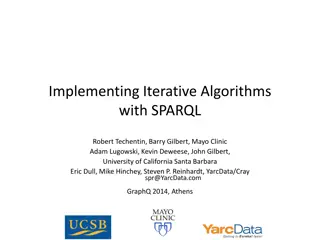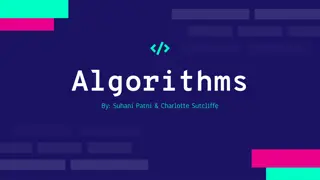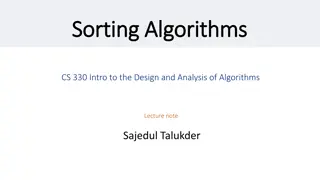
Understanding Algorithms: History, Definition, and Applications
Explore the concept of algorithms, from historical origins to modern-day applications. Learn about computational procedures, problem-solving tools, and the relationship between inputs and outputs. Discover how algorithms have evolved over time and their significance in various fields.
Download Presentation

Please find below an Image/Link to download the presentation.
The content on the website is provided AS IS for your information and personal use only. It may not be sold, licensed, or shared on other websites without obtaining consent from the author. Download presentation by click this link. If you encounter any issues during the download, it is possible that the publisher has removed the file from their server.
E N D
Presentation Transcript
L07: Algorithms CSE120, Winter 2018 Algorithms CSE 120 Winter 2018 Instructor: Justin Hsia Teaching Assistants: Anupam Gupta, Cheng Ni, Sam Wolfson, Eugene Oh, Teagan Horkan Sophie Tian, Nintendo Labo Get ready to Make, Play and Discover! Nintendo Labo is a new line of interactive build-and-play experiences that combine DIY creations with the magic of Nintendo Switch. https://labo.nintendo.com/
L07: Algorithms CSE120, Winter 2018 Administrivia Assignments: Animal Functions due Monday (1/22) Make sure you read the rubric before submitting! Keep working on Portfolio 2
L07: Algorithms CSE120, Winter 2018 Lecture Outline Algorithms Examples of Algorithms Specifying Algorithms 3
L07: Algorithms CSE120, Winter 2018 Definition An algorithm is any well-defined computational procedure that takes some value, or set of values, as input and produces some value, or set of values, as output. An algorithm is thus a sequence of computational steps that transform the input into the output. From textbook Introduction to Algorithms (link) Algorithm (well-defined computational procedure) Inputs Outputs 4
L07: Algorithms CSE120, Winter 2018 Computational Problems Can think of an algorithm as a tool for solving a computational problem The problem statement specifies desired input/output (I/O) relationship The algorithm describes a specific computational procedure that gives you the desired input/output (I/O) relationship Example: Sorting is a computational problem Problem statement: Given a sequence of numbers, put them in order Example I/O: [1, 9, 3, 6, 2] [1, 2, 3, 6, 9] 5
L07: Algorithms CSE120, Winter 2018 Early Algorithms The concept of algorithms pre-dates computers Dances, ceremonies, recipes, and building instructions are all conceptually similar to algorithms Mathematical algorithms go way back: Babylonians defined many fundamental procedures ~3600 years ago, more formal algorithms in Ancient Greece Al-Khwarizmi laid out many algorithms for computation using decimal numbers You implicitly use hundreds of numerical algorithms! Nature runs algorithms (e.g. genes and development) 6
L07: Algorithms CSE120, Winter 2018 Properties of Algorithms Algorithms can be combined to make new algorithms It helps to know standard algorithms Building from correct algorithms helps ensure correctness There are many algorithms to solve the same computational problem Developing a new algorithm to solve a problem can lead to insight about the problem 7
L07: Algorithms CSE120, Winter 2018 Lecture Outline Algorithms Examples of Algorithms Specifying Algorithms 8
L07: Algorithms CSE120, Winter 2018 Algorithms You ve Seen Create a Taijitu from rectangles and ellipses Converting a binary number to decimal Make a character move into place on the screen and many more! 9
L07: Algorithms CSE120, Winter 2018 An Algorithm You ve Seen Before Multiplying two numbers: 2 23 x 7 161 Another multiplication algorithm? Common core box method: 20+3_ 7 140 21 140+21=161 10
L07: Algorithms CSE120, Winter 2018 Algorithm Demo Time! 1) Break into groups of 3, all on same side of table facing forward 2) We will pass out a suit of playing cards (13 total) Using values: A 1, J 11, Q 12, K 13 3) Order your cards from left-to-right as follows: 4, K, 9, 8, A, 3, 6 4) Then turn your cards face-down in place 11
L07: Algorithms CSE120, Winter 2018 1) Search an Unordered List Input: , desired card Output: Yes if desired number is in the list, No otherwise Algorithm: Check each card starting from the left If card is the one you re looking for, then report Yes If a different card, then move on (don t report) If done with numbers, then report No 12
L07: Algorithms CSE120, Winter 2018 2) Sort an Unordered List (version 1) Input: Output: The same list, but now in numerical order Algorithm: Starting from the left, compare two adjacent cards and swap them if they are not in order. Repeat until you reach the end of the list. Repeat until list is ordered. This algorithm is called Bubble Sort 13
L07: Algorithms CSE120, Winter 2018 3) Find the Smallest Number in a List Input: Output: The index/position of the smallest number (5 in this case, since Ace is in the 5th position) Algorithm: Look at the first card and write down (or remember) the card value and the index 1. Check the rest of the cards 1-by-1: if card value is smaller, then write (or remember) the new value and index. 14
L07: Algorithms CSE120, Winter 2018 4) Sort an Unordered List (version 2) Input: Output: The same list, but now in numerical order Algorithm: Find the smallest number (algorithm 3) and move it to the front of the list. Repeat this entire procedure, but for the rest of the list. This algorithm is called Selection Sort 15
L07: Algorithms CSE120, Winter 2018 5) Find Median of a List Note: This is an actual job interview question! Problem: Given a list of numbers (odd length, no repeats), return the median Example: { should output 6 Algorithm: Sort the list (algorithm 2 or 4). Take the number in the middle index (N+1)/2. 16
L07: Algorithms CSE120, Winter 2018 Sorting Sorting is a mind-bogglingly common task Still difficult because it depends on (1) how many things you are sorting and (2) the initial ordering We showed some simple sorting algorithms, but there are a lot more clever ones https://visualgo.net/bn/sorting https://www.toptal.com/developers/sorting-algorithms 17
L07: Algorithms CSE120, Winter 2018 More Famous Algorithms PageRank algorithm Google s measure of the reputation of web pages EdgeRank algorithm Facebook s method for determining what to show on your News Feed Luhn algorithm Credit card number validation Deflate Lossless data compression RSA Encryption Encrypt (secure) data for transmission 18
L07: Algorithms CSE120, Winter 2018 Lecture Outline Algorithms Examples of Algorithms Specifying Algorithms 19
L07: Algorithms CSE120, Winter 2018 Be Specific! A programmer s spouse says, Run to the store and pick up a loaf of bread. If they have eggs, get a dozen. What happens? The programmer comes home with 12 loaves of bread! Algorithms need to be expressed in an unambiguous way for all participants 20
L07: Algorithms CSE120, Winter 2018 Ways to Express Algorithms Many ways to specify an algorithm: Natural Language (e.g. English, ) or Pseudocode Easy for humans to understand, but can be ambiguous or vague Visual and text-based programming languages (e.g. Scratch, Processing) Have an exact meaning with no ambiguity Can be run on a computer Other information-conveying ways e.g. flowcharts or pictures 21
L07: Algorithms CSE120, Winter 2018 Google Query From Larry Page and Sergey Brin s research paper The Anatomy of a Large-Scale Hypertextual Web Search Engine 22
L07: Algorithms CSE120, Winter 2018 Implementations If we specify an algorithm using code in a programming language, we say that the code implements the algorithm A function or program that can be run on a computer Example: Find index of smallest in list Algorithm 3 of demo Pseudocode/natural language Function in Processing Implementation 23
L07: Algorithms CSE120, Winter 2018 Which Language to Use? Different languages are better suited for expressing different algorithms Some languages are designed for specific domains, and are better for expressing algorithms in those domains e.g. Unix shell scripts, SQL, HTML https://en.wikipedia.org/wiki/Domain-specific_language Language choice can affect things like efficiency, portability, clarity, or readability Clarity and readability are VERY important considerations Doesn t affect existence of algorithmic solution 24
L07: Algorithms CSE120, Winter 2018 Programming Languages Programming language sweet spots: C/C++ Code that is close to the hardware Java/C# Portable code Python Fast to write Javascript Great for running in web browsers Processing Great with visuals and interaction Most programming languages can implement (almost) ANY algorithm Equally powerful 25
L07: Algorithms CSE120, Winter 2018 Peer Instruction Question I hand you a cooking recipe with no name is this equivalent to a computational problem, algorithm, or implementation? What can and can t I do with just the recipe? Vote at http://PollEv.com/justinh A. Computational Problem B. Algorithm C. Implementation 26
L07: Algorithms CSE120, Winter 2018 Summary A computational problem is a problem statement with desired I/O relationship An algorithm describes a computational procedure that satisfies/solves a computational problem An implementation is an algorithm written out in a programming language (unambiguous, executable) Properties of algorithms: Can be combined to make new algorithms Knowledge of existing algorithms & correctness help There are many algorithms to solve the same computational problem 27

